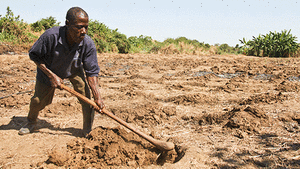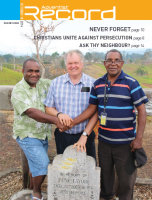Joseph’s* ADRA Appeal bag carried a satisfying weight but if he was honest the thought of another street of mixed responses was starting to play on his mind.
He didn’t expect what happened next.
As he launched into his memorised script (“. . . ADRA works at home and overseas . . .”), Joseph was stopped as the man quickly disappeared inside. Should he leave? Was this an unstated "no thanks" or something else?
A minute later Leebo* returned smiling, holding several hundred-dollar notes.
“I know ADRA (Adventist Development and Relief Agency). They helped me when I was a refugee fleeing Sudan,” he smiled. “Since then I have always wondered how I could pay them back. And now you’re here. Now I know.”
At the doorstep the men spoke about the experience and marvelled at how God had led them to serve and be served throughout their lives. Leebo’s prayer was answered that afternoon—and Joseph left inspired to keep knocking.
In that moment of generosity a shared memory was created and community was born.
In many ways the chuggers—"charity muggers"—who fill urban centres with their bright t-shirts and over-zealous sales pitches have ruined this form of community building. The commercialisation of their pursuit—and the commission-driven vigour that it spawns—has tarnished the great power that lies in public fundraising: the power to bring people together around causes that matter and inspire collaborative action that makes a real difference.
And that's a shame.
Building community and cultivating a sense of solidarity through generous acts were high on Paul’s list when he wrote to the church in Corinth. Early in 2 Corinthians 8 he upholds the Macedonian churches as model givers: “In the midst of a very severe trial, their overflowing joy and their extreme poverty welled up in rich generosity” (verse 2).
Paul offers his call to Corinth to follow suit “not as a commandment” but as “judgement about what is best for you in this matter” (verse 8). Paul realised that clinging onto a wealth of time and resources was a disservice to all involved.
Perhaps he’d felt push-back from those he’d previously encouraged to take up Christ’s ideal of selfless compassion. Maybe he realised people would be blinded by need and selfish ambition when he encouraged them to share with those in need. And that by doing so they’d miss an important point—that the “goal of equality” (verse 14) brings benefits to all.
When done right and with a spirit of partnership, rallying our friends, family and church congregations around the needs of the poor is an essential part of Christ-centred community building. If we take Paul to his word, it’s vital for creating a church connected to people inside and outside of its congregation. And in doing so it helps everyone involved to thrive.
The call for compassion is repeated throughout the Old and New Testaments. But what Paul highlights is that the impact is not one-sided—we all stand to gain.
This month thousands of Adventists are out connecting with and creating community, while at the same time raising vital funds for the work of ADRA. Admittedly it’s not the most exciting Sabbath afternoon pastime but taking part in the ADRA Appeal is an opportunity to talk to our neighbours about what our Church is doing to make the world a better place and ask them to join us in it.
 ADRA Volunteers
ADRA Volunteers
In reality we can do this at any time—but the opportunity to do it with the backup of nationwide announcements on TV and radio only happens once a year.
If every Adventist in Australia gave at least one hour, or helped to raise $A40, we could collectively raise $A1.6 million—enough to help provide opportunities and access to basic needs such as food and employment for more than 63,000 people.
Yes, asking our neighbours to give can be a daunting task. But asking them to listen, to share and to work collaboratively to help those in need doesn’t need to be—especially when we realise the benefits flow both ways.
Reaching out to our neighbours and explaining that beyond "the building on the corner" we are helping people thrive is a powerful opportunity. Even if the person at the door doesn’t give, it's our chance to give an insight into what the Adventist Church is doing to share God’s love around the world.
I’ll be asking my neighbours this month to join me as part of ADRA’s ministry. I might not receive a response quite like Joseph but I know behind my neighbours' doors lies a surprise only God could imagine.
*Joseph’s story was recounted to Braden Blyde following the 2013 ADRA Appeal. Names have been changed to protect privacy. Visit <www.adra.org.au/adrappeal> for resources or to join the Virtual Doorknock.
Braden Blyde is Communications coordinator for ADRA Australia.





